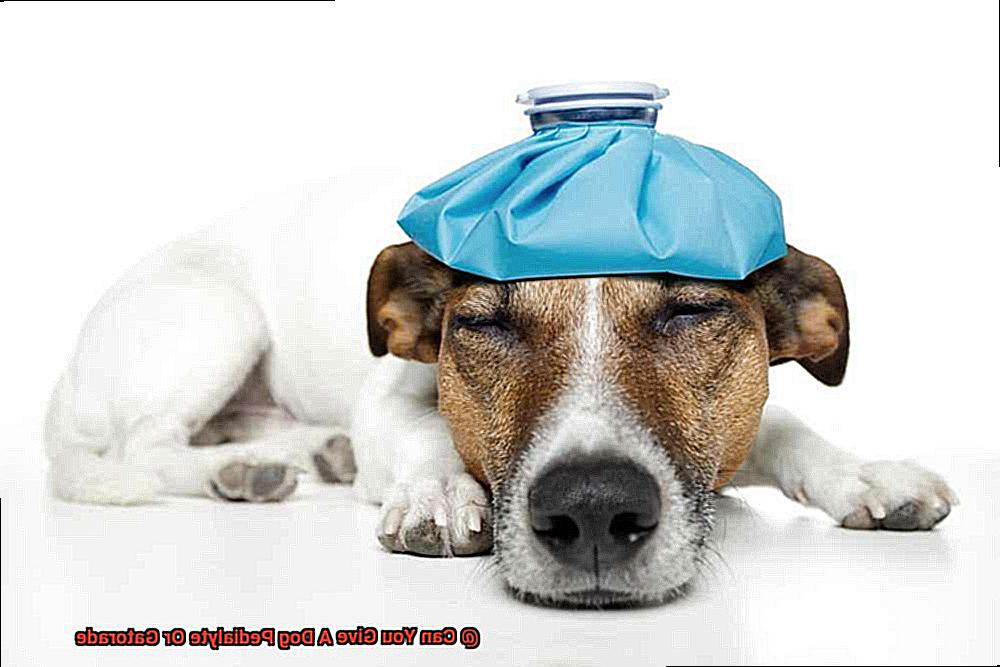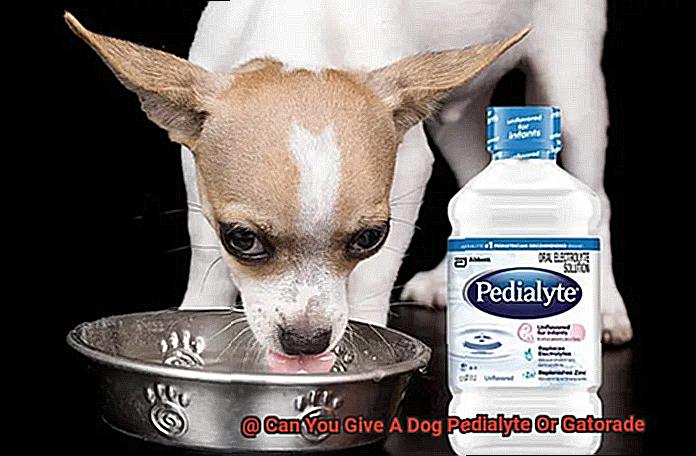Can You Give A Dog Pedialyte Or Gatorade?
When our furry friends aren’t feeling their best or seem a little dehydrated, it’s only natural for us pet owners to worry and want to help them bounce back. We often reach for the human products we have on hand, like Pedialyte and Gatorade, which are known for their rehydration powers. But here’s the big question: Can you give a dog Pedialyte or Gatorade?
In this blog post, we’re going to dig deep into this topic and explore whether giving your dog Pedialyte or Gatorade is a good idea. Sure, these electrolyte solutions are made for humans, but there might be some instances where they could actually benefit our four-legged pals.
Throughout this article, we’ll dish out reliable information and key insights so you can make an informed decision about whether to give your dog Pedialyte or Gatorade. So let’s dive in and uncover the potential perks of using these products to keep our furry buddies hydrated and healthy.
What is Pedialyte and Gatorade?
Contents
- 1 What is Pedialyte and Gatorade?
- 2 Are Pedialyte and Gatorade Safe for Dogs?
- 3 Understanding the Nutritional Needs of Dogs
- 3.1 Protein Power: Building Blocks for Your Frenchie’s Health
- 3.2 Fats: The Good Kind for Your Frenchie’s Well-being
- 3.3 Carbohydrates: Fueling Your Frenchie’s Energy Levels
- 3.4 Vitamins and Minerals: The Secret to a Healthy Frenchie
- 3.5 Hydration: Don’t Forget the Water
- 3.6 Consulting the Experts: Your Frenchie’s Nutritional Needs
- 4 The Potential Risks of Giving Dogs Pedialyte or Gatorade
- 5 Alternatives to Oral Rehydration Solutions for Dogs
- 6 How to Identify Dehydration in Dogs
- 6.1 While Pedialyte and Gatorade can be beneficial for humans in certain situations, it is important to consider the specific nutritional needs and metabolic processes of dogs. What may be safe for us may not necessarily be safe for them.
- 6.2 Additionally, both Pedialyte and Gatorade can have high sodium levels. While sodium is an important electrolyte for hydration, excessive amounts can be harmful to dogs, especially those with underlying health conditions like kidney disease or heart problems. Dogs have different electrolyte requirements compared to humans, so the balance of electrolytes in these products may not be suitable for them.
- 6.3 There are also other safe alternatives that can help rehydrate a dog. Providing fresh water is always the first step. You can also offer small amounts of low-sodium chicken broth to entice your dog to drink more fluids. Additionally, there are specially formulated veterinary oral rehydration solutions available that are safe and effective for dogs.
- 7 When to Seek Veterinary Care for Your Dog’s Dehydration
- 8 Consulting a Veterinarian Before Administering Oral Rehydration Solutions
- 9 Conclusion
As a French Bulldog owner, you want to ensure that your furry friend stays hydrated and healthy. So, when it comes to rehydration drinks like Pedialyte and Gatorade, you may be wondering if they are safe for your dog. Let’s dive into this topic and provide you with accurate and helpful information.
Pedialyte: Designed for Humans, Not Dogs
Pedialyte is an oral electrolyte solution designed to rehydrate children and adults during times of illness or dehydration. It contains a balanced mix of electrolytes like sodium, potassium, and chloride, which helps restore the body’s fluid balance. While it may be suitable for humans, it’s important to note that dogs have different physiological needs.
Dogs have specific dietary requirements that differ from humans. They have a lower tolerance for sugar compared to us, and excessive sugar consumption can lead to gastrointestinal upset or even diabetes. Additionally, some flavors and additives in Pedialyte may not be safe for dogs. Artificial sweeteners like xylitol can be toxic to dogs and cause severe health issues. Always check the ingredient list carefully before considering giving any human drink to your dog.
Gatorade: Designed for Athletes, Not Dogs
Gatorade is a popular sports drink marketed towards athletes for rehydration during physical activities. Like Pedialyte, it contains electrolytes such as sodium and potassium, along with carbohydrates in the form of sugar. While Gatorade may be beneficial for humans during intense exercise, it may not be suitable for dogs.
Dogs have different electrolyte requirements compared to humans, so the balance of electrolytes in Gatorade may not be ideal for them. Additionally, the high sugar content can cause digestive issues in dogs. It’s crucial to remember that excessive sugar intake is not recommended for our furry friends.
Consult with Your Veterinarian
Before considering giving Pedialyte or Gatorade to your French Bulldog, it’s essential to consult with your veterinarian. They have the knowledge and expertise to guide you on safe and appropriate hydration options for your dog. They may recommend specific products designed for canine hydration or provide alternative solutions to address dehydration.
Safe Alternatives for Canine Hydration
While Pedialyte and Gatorade may not be suitable for dogs, there are other safe alternatives that can help rehydrate your French Bulldog. Here are a few options:
- Fresh Water: Provide access to clean and fresh water at all times. This is the simplest and most natural way to keep your dog hydrated.
- Low-Sodium Chicken Broth: Offer small amounts of low-sodium chicken broth as a tasty and hydrating treat. Make sure it doesn’t contain any ingredients harmful to dogs, such as onions or garlic.
Are Pedialyte and Gatorade Safe for Dogs?
As pet owners, we always want to ensure the health and well-being of our furry friends, especially when they are feeling under the weather or dehydrated. When it comes to rehydration drinks like Pedialyte and Gatorade, we may wonder if they are safe options for our beloved French Bulldogs. While these electrolyte solutions can be safe for dogs in certain situations, it is crucial to consult with a veterinarian before administering them. Let’s delve into why seeking professional advice is essential.
Different Hydration Needs and Metabolic Processes:
Dogs have different hydration needs and metabolic processes compared to humans. What works for us may not work for our furry companions. Consulting with a veterinarian is vital because they understand your dog’s unique needs and can determine whether Pedialyte or Gatorade is appropriate for their specific condition.
Pedialyte: A Safer Option for Dogs:
Pedialyte is considered a safer option for dogs compared to Gatorade. It contains fewer additives and artificial sweeteners that can potentially upset your dog’s stomach or cause other health issues. However, even Pedialyte should be given under veterinary guidance to prevent electrolyte imbalances. Excessive intake of Pedialyte can have adverse effects on your dog’s health, so it’s important to follow your vet’s instructions regarding dosage and frequency.
Gatorade: Best Left for Humans:
Gatorade, with its high sugar content and artificial additives, should be avoided for dogs. These ingredients can potentially cause gastrointestinal upset or other health problems. It’s best to leave Gatorade as a drink exclusively for humans and prioritize your dog’s health with veterinarian-approved options.
Water: The Best Source of Hydration:
While electrolyte solutions can be helpful in certain situations, water should always be the primary source of hydration for dogs. Regular access to clean, fresh water is essential for their overall well-being. Any deviations from water intake should only be done under professional advice.
Consulting with Your Veterinarian:
When in doubt, always consult with a veterinarian before giving your French Bulldog any electrolyte solution. They will assess your dog’s condition and provide appropriate recommendations tailored to their specific needs. Remember, your vet is the best source of knowledge and expertise when it comes to your dog’s health.
While Pedialyte can be safe for dogs in specific situations, it is crucial to consult with a veterinarian before administering it. Gatorade should generally be avoided due to its high sugar content and artificial additives.
Water should always be the primary source of hydration for dogs.
By seeking professional advice, you can ensure that you are making the best decisions for your furry friend’s health and well-being.
Understanding the Nutritional Needs of Dogs
French Bulldogs are adorable little companions known for their playful nature and distinctive bat-like ears. However, just like any other dog breed, they require proper nutrition to maintain optimal health and well-being. In this article, we will explore the essential nutritional needs of French Bulldogs and how you can contribute to their overall health.
Protein Power: Building Blocks for Your Frenchie’s Health
Protein is a key nutrient for French Bulldogs as it helps build and repair tissues, supports their immune system, and provides them with energy. High-quality animal-based proteins like chicken, beef, fish, and eggs are highly recommended for your Frenchie. These protein sources are not only delicious but also provide essential amino acids that are vital for their growth and development.
Fats: The Good Kind for Your Frenchie’s Well-being
Fats are another important component of your Frenchie’s diet. They provide energy, support brain function, aid in nutrient absorption, and help maintain healthy skin and coat. Good sources of healthy fats for French Bulldogs include fish oil, flaxseed oil, and chicken fat. These fats not only enhance the taste of their food but also contribute to their overall health and vitality.
Carbohydrates: Fueling Your Frenchie’s Energy Levels
While proteins and fats take the spotlight in your Frenchie’s diet, carbohydrates also play a crucial role. Complex carbohydrates like whole grains (brown rice, oats) provide a steady source of energy and fiber. On the other hand, simple carbohydrates (white rice, wheat flour) should be avoided as they can cause spikes in blood sugar levels.

Vitamins and Minerals: The Secret to a Healthy Frenchie
Vitamins and minerals are essential for your Frenchie’s overall health. Commercial dog foods usually contain adequate amounts of these nutrients, but some owners may choose to supplement their Frenchie’s diet with additional vitamins or minerals under the guidance of a veterinarian. Vitamins A, D, E, B complex vitamins, calcium, phosphorus, zinc, and iron are all crucial for their well-being.
Hydration: Don’t Forget the Water
Water is often overlooked but vital for dogs. It is essential for digestion, circulation, temperature regulation, joint lubrication, and waste elimination. Always ensure that fresh water is available to your Frenchie at all times. If you notice your Frenchie is not drinking enough water, consult with your vet to address any underlying health issues.
Consulting the Experts: Your Frenchie’s Nutritional Needs
To ensure that your Frenchie’s nutritional needs are being met, it’s important to consult with a veterinarian or a canine nutritionist. They will guide you on the appropriate type and amount of food, as well as any necessary supplements, tailored specifically to your Frenchie’s individual requirements.
The Potential Risks of Giving Dogs Pedialyte or Gatorade
We know how much you care about your furry friends and want to keep them happy and healthy. But when it comes to rehydration, can you reach for a bottle of Pedialyte or Gatorade? Well, hold your horses because we’ve got some important information to share with you.
- High sugar content: These popular beverages are often packed with sugar, which can lead to weight gain, dental issues, and even diabetes in dogs. Our furry friends have different nutritional needs than us humans, and their bodies aren’t built to handle excessive sugar intake.
- Artificial sweeteners: Some variations of Pedialyte and Gatorade contain artificial sweeteners like xylitol, which is highly toxic to dogs. Xylitol can cause a sudden drop in blood sugar levels, leading to symptoms like vomiting, weakness, seizures, and even liver failure. So it’s crucial to check the ingredients list before offering any beverage to your pup.
- Upset tummies: Dogs can be sensitive to certain flavors and additives found in these drinks. Artificial colors, flavors, or preservatives can cause gastrointestinal upset, diarrhea, or allergic reactions in our four-legged pals.
- Electrolyte imbalances: While it’s true that dogs may need electrolyte replacement in certain situations like dehydration or illness, it’s essential to seek guidance from a veterinarian. Giving these beverages in excessive amounts or without proper supervision can lead to electrolyte imbalances, which can have serious consequences for your pup’s health.
- Not formulated for dogs: Pedialyte and Gatorade are formulated for human consumption and don’t provide the necessary nutrients found in dog-specific electrolyte solutions or rehydration products. There are specialized products available that are designed to meet the unique needs of our canine companions and are generally a safer option.
Alternatives to Oral Rehydration Solutions for Dogs
Today, we’re going to talk about the importance of oral rehydration solutions for dogs and some natural alternatives that can do the trick. You know, sometimes our furry friends can get a little dehydrated, whether it’s from a hot summer day or a bout of diarrhea. Just like humans, dogs need to replenish those fluids and electrolytes they’ve lost. And while Pedialyte and Gatorade are go-to options for us humans, they may not be the best choices for our Frenchies.
So what’s a concerned pet parent to do? Well, fret not. There are some pawsome natural alternatives that can work wonders for your four-legged pal. One option is homemade electrolyte solutions using ingredients you probably already have in your kitchen. Coconut water is a great choice, as it’s packed with electrolytes and is gentle on their tummies. Diluted chicken or beef broth can also do the trick, providing both hydration and some much-needed flavor. And if you’re in a pinch, plain water with a pinch of salt can help too.
Now, you might be wondering why these natural alternatives are a better bet than commercial products. Well, for starters, they’re usually free of artificial flavors, colors, and sweeteners that can upset your Frenchie’s delicate digestive system. Plus, they’re generally easier on their tummies, reducing the risk of any unwanted stomach upsets or diarrhea.
But hold your horses. Before you start mixing up these concoctions for your furry friend, it’s important to consult with your veterinarian first. They’ll be able to provide personalized advice based on your Frenchie’s specific needs and health conditions. Especially if your pup is experiencing severe dehydration or has any underlying health issues, it’s always best to seek professional guidance.
Remember, monitoring your Frenchie’s response to treatment is crucial. If you don’t see any improvements or if things seem to be getting worse, don’t hesitate to reach out to your vet. They’re the experts, after all, and can provide the best advice for your precious pup.
How to Identify Dehydration in Dogs
As responsible dog owners, we always want to ensure that our furry friends stay hydrated and healthy. When it comes to dehydration in dogs, one common question that often arises is whether dogs can safely consume Pedialyte or Gatorade. These oral rehydration solutions are commonly used by humans to replenish fluids and electrolytes, but are they safe for our four-legged companions?
While Pedialyte and Gatorade can be beneficial for humans in certain situations, it is important to consider the specific nutritional needs and metabolic processes of dogs. What may be safe for us may not necessarily be safe for them.
Both Pedialyte and Gatorade contain ingredients that can potentially be harmful to dogs. For example, these products often contain sugar or artificial sweeteners, such as sucralose or aspartame. Dogs have different digestive systems and metabolisms compared to humans, and their bodies may not process these ingredients in the same way. High sugar or artificial sweetener intake can lead to gastrointestinal upset and even contribute to conditions like obesity in dogs.
Additionally, both Pedialyte and Gatorade can have high sodium levels. While sodium is an important electrolyte for hydration, excessive amounts can be harmful to dogs, especially those with underlying health conditions like kidney disease or heart problems. Dogs have different electrolyte requirements compared to humans, so the balance of electrolytes in these products may not be suitable for them.
If your dog is experiencing dehydration or an electrolyte imbalance, it is crucial to consult with a veterinarian before administering any oral rehydration solution. Veterinarians have access to specialized products that are specifically designed for dogs, which can provide the necessary hydration and electrolyte balance without any potential risks.
There are also other safe alternatives that can help rehydrate a dog. Providing fresh water is always the first step. You can also offer small amounts of low-sodium chicken broth to entice your dog to drink more fluids. Additionally, there are specially formulated veterinary oral rehydration solutions available that are safe and effective for dogs.
Remember, each dog is unique and may require individualized care. What works for one dog may not work for another. Therefore, seeking professional advice from a veterinarian is always recommended before attempting to treat dehydration or imbalances in dogs.
When to Seek Veterinary Care for Your Dog’s Dehydration
As a dog owner, it’s important to be aware of the signs and symptoms of dehydration in your furry friend. Dehydration can be a serious condition that requires veterinary care, so knowing when to seek professional help is crucial for your dog’s well-being. Here are some key indicators that it’s time to consult with a veterinarian:
- Dry Mouth and Sticky Gums: One of the first signs of dehydration in dogs is a dry mouth and sticky gums. If you notice that your dog’s mouth feels dry or their gums are sticky, it may be a sign that they are dehydrated.
- Sunken Eyes: Dehydrated dogs often have sunken eyes. If you notice that your dog’s eyes look sunken or dull, it may indicate dehydration.
- Loss of Skin Elasticity: Another sign of dehydration is a loss of skin elasticity. You can test this by gently pinching your dog’s skin on the back of their neck. If the skin takes longer than usual to go back to its original position, it may be a sign of dehydration.
- Lethargy: Dehydration can cause your dog to become lethargic and lack energy. If your dog seems unusually tired or unwilling to engage in their regular activities, it’s time to seek veterinary care.
- Decreased Urine Output: A decrease in urine output can also be a sign of dehydration. If you notice that your dog is urinating less frequently or producing very little urine, it’s important to consult with a veterinarian.
If your dog is showing any signs of dehydration, it is important to offer them water immediately. However, if they refuse to drink or are unable to keep water down, it is time to seek veterinary care.
There are several factors that can cause dehydration in dogs, including illness, excessive heat, diarrhea, vomiting, and insufficient water intake. If your dog has been exposed to any of these conditions and is showing signs of dehydration, it is crucial to consult with a veterinarian.
Puppies, senior dogs, and dogs with certain medical conditions are more susceptible to dehydration and may require immediate veterinary attention if they show any signs of dehydration.
In some cases, dehydration can be a symptom of an underlying health issue such as kidney disease or diabetes. A veterinarian will be able to diagnose and treat the underlying cause of dehydration.
If your dog’s condition worsens or if they exhibit severe symptoms such as rapid breathing, pale gums, collapse, or seizures, it is crucial to seek emergency veterinary care immediately. These could be signs of severe dehydration or other life-threatening conditions.
When in doubt, it is always best to err on the side of caution and consult with a veterinarian if you suspect your dog may be dehydrated. They will be able to provide the necessary guidance and treatment to ensure your dog’s well-being.
Consulting a Veterinarian Before Administering Oral Rehydration Solutions
When it comes to keeping our adorable bat-eared buddies healthy and happy, we want to make sure we’re doing everything right. That’s why it’s important to consult a veterinarian before administering any oral rehydration solutions to your precious Frenchie.
You see, veterinarians are like the superheroes of the animal world. They have the knowledge and expertise to provide the best advice tailored specifically for your dog’s needs. Just like how we go to a doctor when we’re feeling under the weather, our furry friends deserve the same level of care.
Now, you might be thinking, “But can’t I just give my Frenchie some Pedialyte or Gatorade?” Well, hold your horses (or should I say, hold your bulldogs) because it’s not that simple. While these solutions may work wonders for us humans, they might not have the same effect on our four-legged pals.
Pedialyte, for example, contains electrolytes and minerals that can help replenish fluids in humans. But dogs have different nutritional requirements, and what works for us may not work for them. Giving them the wrong type or amount of fluids can actually do more harm than good.
And let’s talk about Gatorade. Sure, it’s tasty and refreshing after a workout, but it’s not exactly dog-friendly. It contains sugars and artificial additives that can be harmful to dogs if consumed in large quantities. We don’t want our Frenchies getting a sugar rush or experiencing any tummy troubles, do we?
That’s where your trusted veterinarian comes in. They’ll be able to recommend specific oral rehydration solutions designed for dogs or suggest alternative methods if necessary. They’ll consider factors like your Frenchie’s age, size, health condition, and the underlying cause of dehydration to provide them with the best treatment possible.
57Teg1sbZso” >
Conclusion
In conclusion, it is important to remember that while Pedialyte and Gatorade may seem like quick solutions for rehydrating your dog, they are not necessarily the best options.
These drinks contain ingredients that can be harmful to dogs, such as artificial sweeteners and high levels of sodium. It is always best to consult with your veterinarian before giving your dog any type of electrolyte solution.
They will be able to provide you with the appropriate guidance and recommend safe alternatives if necessary.




